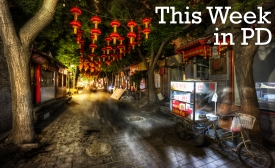china

A look back at trending topics in public diplomacy during the past week.
The government has pledged a £1.5 million grant to the Royal Shakespeare Company, to translate the entire works of Shakespeare into Chinese. The Department for Culture, Media and Sport will give the RSC a further £300,000 to tour through China, in the hopes of boosting tourism and "cultural links".
The State of Kuwait is currently taking part in the third Arabic Arts Festival held in the Chinese capital Beijing, with participants underlining necessity of boosting ties and cultural interactions between the Chinese and Arab nations. The cultural event has already kicked off, with Kuwait's participation, led by Mohammad Al-Asousi, Deputy Secretary General of the National Council for Culture, Arts, and Letters.
China's largest steel maker Hebei Iron & Steel Group is planning to set up ahigh-volume joint venture in South Africa. The first phase of the project with a three-million-ton capacity will start construction in 2015and be put into use in 2017. The second phase with two million tons of capacity will startproduction in 2019. The project is expecting a total annual capacity of five million tons upon completion.
There is a famous saying in the Quran "Seeking knowledge, even as far as China". And the great ancient Chinese thinker Confucius once said: "Studying alone without friends results in a shallow and narrow mind". For thousands of years, the two great civilizations of Arab and Chinese developed through constant exchanges.
Intended to boost China’s “soft power”, the centres take the name of the peace-espousing sage. They tap into growing global demand for Chinese-language teaching. But they are also fuelling anxiety about academic freedom.
The government has ordered TV stations to increase the airing of “patriotic” shows, of which anti-Japan dramas are exhibit No. 1. On Aug. 15, the anniversary of Japan’s surrender, a headline in the Global Times, a party newspaper, said, “Prime time TV to be more anti-fascist.” China has a long tradition of producing war movies for propaganda purposes, mostly good-versus-evil dramas drawn from the all-too-real and brutal war against Japan.
A latest poll unveiled on Tuesday that tapping public diplomacy to repair bilateral relations continued to attract public support from both China and Japan. The contribution of people-to-people interactions to improving ties were endorsed by 64.4 percent of the Japanese public and 63.4 percent of its Chinese counterpart, , according to the 10th Public Opinion on China-Japan Relations survey, which has been co-sponsored annually by China Daily and Japanese nonprofit think tank Genron NPO.







